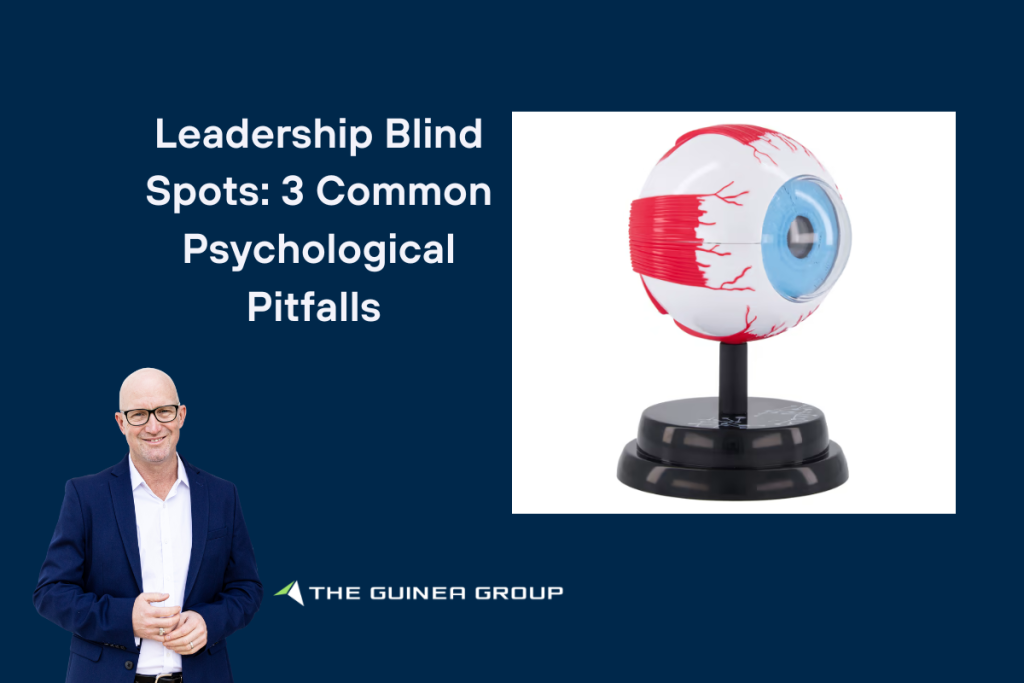Anton Guinea
Entrepreneur, Speaker, bestselling author, and founder of The Guinea Group of Companies. For over 15 years, Anton has helped leaders move their teams to become psychologically safe, physically safe and overall better versions of themselves.

Leadership Blind Spots: 3 Common Psychological Pitfalls

Every eye has a blind spot in the visual field where the optic nerve enters the eye. There are no receptors in those areas. With both eyes open, the blind spots are not perceived because the visual fields of the two eyes overlap. Blind spots can be difficult to detect, because of the ability the brain has to “fill in” or ignore the missing portion of the image.
That first paragraph is about your physical body. What about your psychology?
Blind spots are a thing. And in psychology, blind spots are a lack of insight or awareness – often persistent – about a specific area of one’s behaviour or personality. The lack of insight is typically because the awareness of one’s true feelings and motives could be painful. In short, we do things (and say things) in a way that we are not aware of how they are perceived. Or in a way that hurts, not helps our relationships.
Alternatively, we make assumptions (fill in the blanks – through our biases) about events or hoomanz. Which some of the time, turn out to be wrong.
So, what are some common leadership blind spots, and what can you do about them?
1. Confirmation Bias: The Echo Chamber Effect
Confirmation bias is a cognitive shortcut (habit or pattern) that leads us to seek out and interpret information in ways that confirm our existing beliefs and values, while dismissing or ignoring contradictory data. Leaders are particularly susceptible to this bias as their decisions can significantly impact their organisations.
To mitigate confirmation bias, leaders must cultivate a culture of diverse perspectives and encourage constructive dissent. Embrace the value of cognitive diversity by seeking input from team members with varying backgrounds and experiences. Challenge your own assumptions, actively seek alternative viewpoints, and encourage others to do the same. By fostering an open and inclusive environment, leaders can reduce the impact of confirmation bias and make more informed decisions.
2. Overconfidence: The Perils of Illusory Superiority
Leaders often reach their positions due to their confidence and competence. However, this confidence can sometimes transform into overconfidence, a blind spot that can lead to reckless decision-making. Overconfident leaders may underestimate risks, overestimate their abilities, and disregard feedback from others.
To counter overconfidence, leaders should embrace a growth mindset. Continuously seek opportunities for self-reflection and feedback. Encourage team members to voice their concerns, challenge assumptions, and provide constructive criticism. Moreover, consider conducting post-mortems on major decisions to evaluate their outcomes objectively. By acknowledging the limitations of one’s knowledge and expertise, leaders can make more balanced and effective choices.
3. The Status Quo Bias: Resisting Change
Leaders often excel at driving change within their organisations. Paradoxically, they can also exhibit a psychological blind spot known as the status quo bias. This bias leads leaders to resist change and cling to familiar routines, even when evidence suggests that change is necessary for growth and innovation.
To combat the status quo bias, leaders must foster a culture of adaptability. Encourage experimentation, celebrate learning from failures, and promote a mindset of continuous improvement. Seek out diverse opinions and ideas and be open to revising long-standing practices when evidence supports it. By modelling a willingness to change and adapt, leaders can inspire their teams to embrace change as a driver of progress.
In conclusion, recognising and addressing psychological blind spots is an essential aspect of effective leadership. Confirmation bias, overconfidence, and the status quo bias are just a few of the cognitive traps that leaders must navigate. By actively working to mitigate these blind spots through fostering open dialogue, promoting a growth mindset, and championing adaptability, leaders can elevate their decision-making, enhance team dynamics, and ultimately achieve greater success in their roles.
Remember, leadership is a journey of continuous self-improvement; and self-awareness is the compass that guides us along the way.
And please click the image below if you’d like to chat about what leadership means to you.
If you would like to learn more about Anton or The Guinea Group, please click here to book into Anton’s calendar, to:
UPGRADE your Mindset
UPSKILL your Leadership
UPLIFT your Teams
About Anton
Anton has dedicated his working life to helping leaders to upgrade their mindset, upskill their leadership, and uplift their teams! With a focus on helps leaders to better lead under pressure. Anton is an entrepreneur, speaker, consultant, bestselling author and founder of The Guinea Group. Over the past 19 years, Anton has worked with over 175+ global organisations, he has inspired workplace leadership, safety, and cultural change. He’s achieved this by combining his corporate expertise, education (Bachelor of HR and Psychology), and infectious energy levels.
Work With Anton!
Subscribe to our Newsletter
